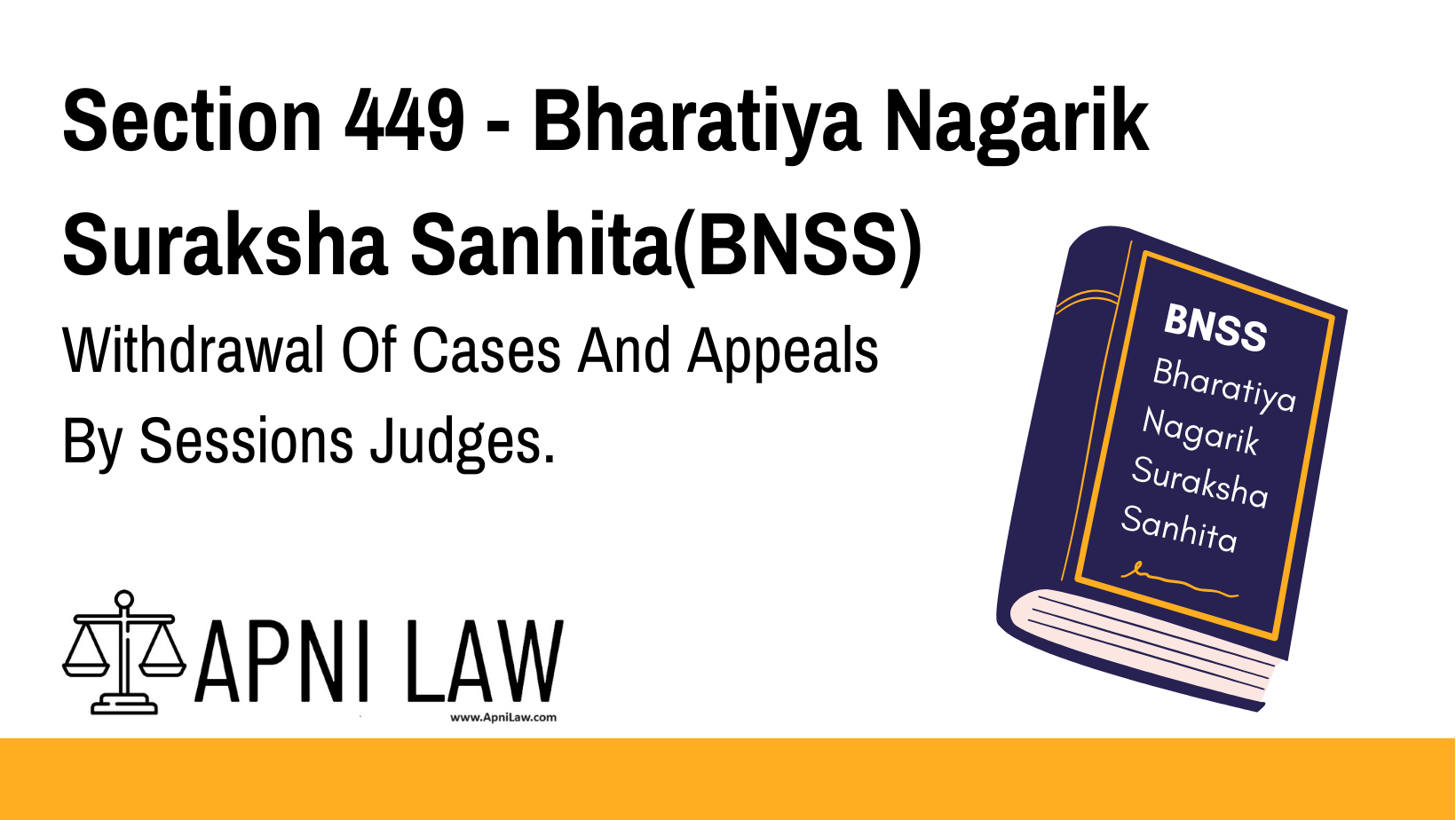Code: Section 449 BNSS
(1) A Sessions Judge may withdraw any case or appeal from, or recall any case or
appeal which he has made over to a Chief Judicial Magistrate subordinate to him.
(2) At any time before the trial of the case or the hearing of the appeal has commenced
before the Additional Sessions Judge, a Sessions Judge may recall any case or appeal
which he has made over to any Additional Sessions Judge.
(3) Where a Sessions Judge withdraws or recalls case or appeal under sub-section (1)
or sub-section (2), he may either try the case in his own Court or hear the appeal himself, or
make it over in accordance with the provisions of this Sanhita to another Court for trial or
hearing, as the case may be.
Explanation of Section 449 BNSS
Section 449 provides specific powers to Sessions Judges regarding the withdrawal and recall of cases and appeals. These provisions grant Sessions Judges flexibility in managing the cases and appeals that are assigned to subordinate Courts. The section outlines procedures for a Sessions Judge to recall or withdraw cases or appeals from either a Chief Judicial Magistrate or an Additional Sessions Judge, and decide whether to handle the case personally or transfer it to another Court.
Key Provisions:
- Withdrawal or Recall from Chief Judicial Magistrate:
- Under sub-section (1), a Sessions Judge can withdraw or recall any case or appeal that has been transferred to a Chief Judicial Magistrate subordinate to the Sessions Judge. This allows the Sessions Judge to reassess and potentially take direct control of the case or appeal if necessary.
- Recall from Additional Sessions Judge:
- Sub-section (2) gives the Sessions Judge the authority to recall a case or appeal that has been assigned to an Additional Sessions Judge, provided that the trial has not yet commenced. This allows the Sessions Judge to intervene in cases before the trial begins.
- Discretion of the Sessions Judge:
- Sub-section (3) outlines the options available to a Sessions Judge after withdrawing or recalling a case or appeal. The Sessions Judge may:
- Try the case personally in their own Court.
- Hear the appeal personally.
- Transfer the case or appeal to another Court for further trial or hearing, as appropriate under the BNSS.
- Sub-section (3) outlines the options available to a Sessions Judge after withdrawing or recalling a case or appeal. The Sessions Judge may:
Illustration
Example 1: Withdrawal from Chief Judicial Magistrate
A Sessions Judge finds that a case involving serious charges has been transferred to a Chief Judicial Magistrate under his jurisdiction. The Sessions Judge decides to withdraw the case to ensure it is heard in his own Court due to the complexity of the matter. The Sessions Judge now directly handles the trial of the case.
Example 2: Recall from Additional Sessions Judge
A Sessions Judge has referred a case to an Additional Sessions Judge for trial. Before the trial begins, the Sessions Judge decides to recall the case to his own Court due to the legal intricacies involved. The Sessions Judge may now choose to hear the case personally.
Common Questions and Answers on Section 449 BNSS
1. Can a Sessions Judge withdraw a case that has been transferred to a Chief Judicial Magistrate?
- Answer: Yes, under sub-section (1), a Sessions Judge has the power to withdraw or recall a case or appeal from a Chief Judicial Magistrate subordinate to him at any time.
2. Can a Sessions Judge recall a case from an Additional Sessions Judge before the trial begins?
- Answer: Yes, according to sub-section (2), a Sessions Judge can recall a case from an Additional Sessions Judge at any time before the trial has started.
3. What options does a Sessions Judge have after recalling or withdrawing a case?
- Answer: As per sub-section (3), a Sessions Judge can:
- Try the case in their own Court.
- Hear the appeal themselves.
- Transfer the case or appeal to another Court for further hearing or trial.
Conclusion
Section 449 provides Sessions Judges with the authority to withdraw or recall cases and appeals from subordinate courts, such as Chief Judicial Magistrates or Additional Sessions Judges, as they deem necessary. This ensures that Sessions Judges have the flexibility to manage cases effectively and ensures that important cases are heard at the appropriate level.








